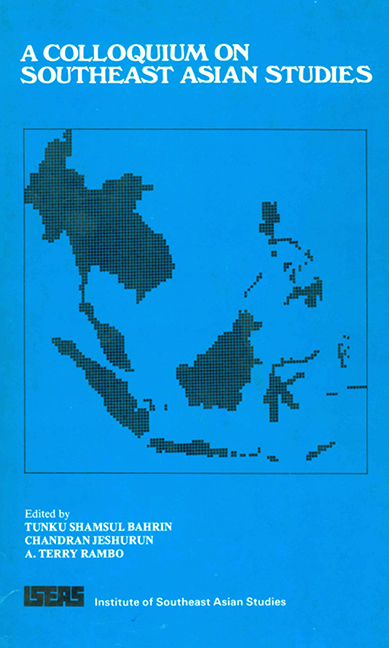Book contents
- Frontmatter
- Contents
- Foreword
- Preface
- Acknowledgements
- Introduction
- Contributors
- PART I TEACHING AND RESEARCH
- THE CONCEPTUAL THEORIES
- THE EXTRAREGIONAL EXPERIENCE
- 4 Southeast Asian Studies in Australia
- 5 Southeast Asian Studies in France
- 6 Southeast Asian Studies in the United Kingdom
- 7 Southeast Asian Studies in the United States: Towards an Intellectual History
- THE REGIONAL PERSPECTIVE
- THE PROBLEMS OF TEACHING AND RESEARCH
- PART II ENVIRONMENT AND DEVELOPMENT
7 - Southeast Asian Studies in the United States: Towards an Intellectual History
from THE EXTRAREGIONAL EXPERIENCE
Published online by Cambridge University Press: 21 October 2015
- Frontmatter
- Contents
- Foreword
- Preface
- Acknowledgements
- Introduction
- Contributors
- PART I TEACHING AND RESEARCH
- THE CONCEPTUAL THEORIES
- THE EXTRAREGIONAL EXPERIENCE
- 4 Southeast Asian Studies in Australia
- 5 Southeast Asian Studies in France
- 6 Southeast Asian Studies in the United Kingdom
- 7 Southeast Asian Studies in the United States: Towards an Intellectual History
- THE REGIONAL PERSPECTIVE
- THE PROBLEMS OF TEACHING AND RESEARCH
- PART II ENVIRONMENT AND DEVELOPMENT
Summary
This paper attempts to describe and assess the evolving interests of American academics in Southeast Asia over the last twenty-five years. Drawing on 680 proposals from Americans for doctoral dissertation research in Southeast Asia submitted to the Foreign Area Fellowship Programme and the Social Science Research Council since 1951, it reviews the changing balances between countries and disciplines, among research topics and approaches, and the more general intellectual currents these changes manifest. Hopefully, the paper will provide a useful and dynamic sense of the state of the art in the United States today.
The state of Southeast Asian Studies in the United States has been formally addressed a number of times over the past 35 years. In 1943, Robert Heine-Geldern published A Survey of Studies of Southeast Asia at American Universities and Colleges, based on a study conducted in the previous year. In 1951, the Joint Committee on Southern Asia, sponsored by the American Council of Learned Societies and the Social Science Research Council produced Southern Asian Studies in the United States: A Survey and Plan, including Southeast Asian Studies in its purview. This was followed by George McT. Kahin's Teaching and Research Relating to Southeast Asia in American Colleges and Universities, April 1952. In 1968, Robert O. Tilman and Gerry D. Brewer prepared a preliminary paper, Southeast Asia Specialists of the World: A Profile and an Analysis, based on a survey ultimately published in 1969 by Tilman as the International Biographical Directory of Southeast Asian Specialists. Although worldwide in scope, these materials contain a great deal of information on the field in the United States. Five years later, Gerald Maryanov, utilizing Tilman's data and several other sources, published The Condition of Southeast Asian Studies in the United States: 1972 (1974). In addition, the massive Language and Area Studies Review, by Richard D. Lambert (1973), analyzes a vast compilation of data regarding Southeast Asian scholars, courses, and programmes in the United States.
- Type
- Chapter
- Information
- A Colloquium on Southeast Asian Studies , pp. 72 - 87Publisher: ISEAS–Yusof Ishak InstitutePrint publication year: 1981



